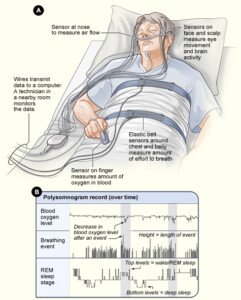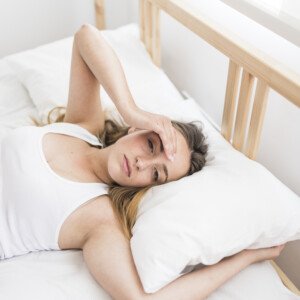Why is it that the only apnea episodes that awaken you are seemingly only those that occur just as you’re falling asleep?
Is this caused by a collapsing airway — upon sleep onset — that then spontaneously becomes firm and allows you to breathe once your brain arouses you that your oxygen levels have dipped?
Well, it’s certainly easy to draw that conclusion until you learn about a phenomenon called sleep-onset central apnea — also known as transitional central apnea.
There are actually different kinds of central sleep apnea. Put simply, CSA is when the body “forgets” to take a breath.
You can have the largest airway in the world, the biggest jaw and the most activated pharyngeal muscles during sleep…but still “forget” to take a breath.
So there you are, aware that you’re on the verge of drifting off to sleep, but right after this happens, you’re jarred awake by the awareness that you haven’t taken a breath for a while and feel very short of breath – leading to a deep breath — and sometimes a little bit of panic.
But for some people, this has occurred so frequently that every time it happens, it’s just a routine inconvenience, and they fall right back asleep.
All seems well again and you gradually drift off towards the first stage of sleep…when suddenly, you’re again abruptly wakened by the need to take a deep breath.
For some individuals this keeps happening, sometimes delaying finally falling asleep for over an hour.
“There are patients who have central apnea surrounding sleep-wake transition that may not be clinically relevant,” says Dr. Nancy Foldvary-Schaefer, DO, MS, and Director, Sleep Disorders Center, Cleveland Clinic.
However, Dr. Foldvary-Schaefer also points out, “Any apnea can wake you up, but those in light sleep are more likely to do this, as the threshold to arousal is lower in light sleep than deep sleep.”
The big question: Does this keep happening after you finally fall asleep and become too deep in slumber to be jarred to conscious awareness of the need to breathe?
Yes, that is certainly possible for a person who has obstructive or central sleep apnea. This disorder doesn’t always wait till you’re in deep sleep to manifest itself.
Sleep Transition Apnea but no Obstruction
STA, or sleep-onset (central) apnea, can occur in people who do not have obstructive sleep apnea — but those with OSA can also have central episodes as well.
Transitional apnea is a common phenomenon and quite frightening to those who fear that they’ll die if they don’t keep waking up to breathe again.
Many people eventually fall asleep within half an hour and, by definition, no longer experience sleep transition apnea at that point.
Plus, those who experience STA don’t always have it every night, and may, in fact, have it only occasionally.
STA can have different causes including obstructive sleep apnea and periodic limb movement disorder.
But remember, it can also be present in people who are otherwise normal during the rest of their sleep and in these cases, is not related to upper airway resistance.
If transitional apnea describes your experiences, do not assume that this means you don’t have obstructive sleep apnea – especially if you have symptoms strongly suggestive of OSA:
• The sleeper is observed to have paused breathing or frequent gasping
• Snoring (though the absence of snoring does not rule out OSA.)
• Excessive daytime sleepiness; frequent need to nap but not feeling refreshed afterwards; easily falling asleep while watching TV, reading or driving
A sleep study will determine if, throughout the night, you are experiencing pauses in respiration and/or shallow breathing, and when and how frequently these events occur.

Sleep study
If the results of the study show that your only events are the sleep-onset pauses in breathing, and this phenomenon is fully explained to you, this new knowledge may be enough to actually reduce these occurrences – as anxiety about them can actually contribute to their occurrences.


 Certified by the American Board of Neurology and Psychiatry in Neurology, Clinical Neurophysiology and Sleep Medicine,
Certified by the American Board of Neurology and Psychiatry in Neurology, Clinical Neurophysiology and Sleep Medicine, 









